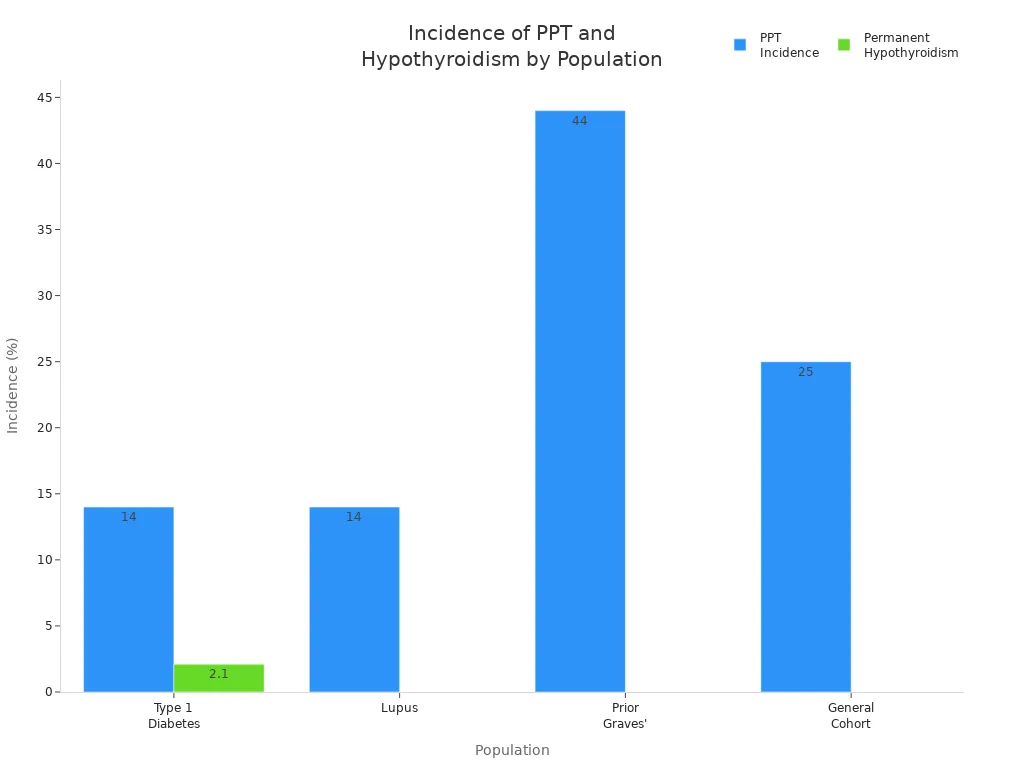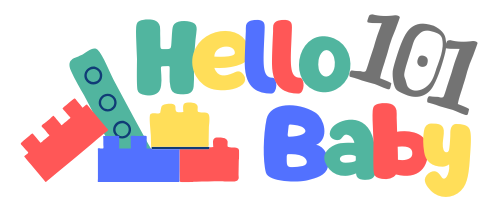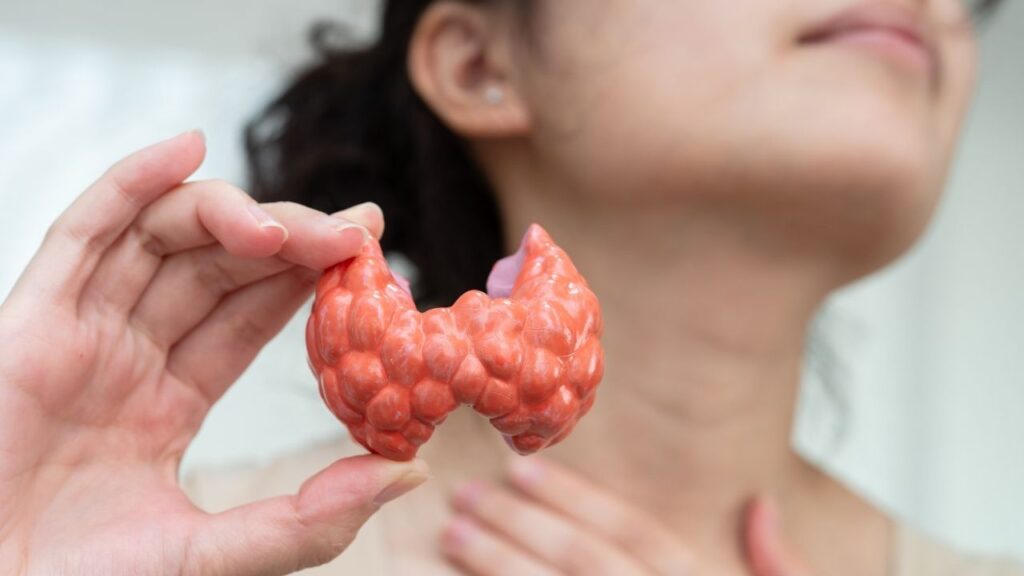Bringing your baby home is exciting but can also feel too much. You may see changes in how you feel or how much energy you have. You might wonder if this is just normal recovery.
About 5% of new mothers around the world have thyroid problems after giving birth. It is important to look for signs of postpartum thyroid issues.
Finding these signs early can keep you healthy and help your baby grow well. If something feels wrong, trust yourself and talk to your healthcare provider.
Signs of postpartum thyroid issues
After you have a baby, your body and mood can change. Some changes are normal, but others may be early signs of postpartum thyroid issues. If you know what to watch for, you can get help sooner.
Hyperthyroid symptoms
If your thyroid is overactive, your body feels like it is going too fast. This often starts in the first four months after birth. It can last from one to three months. About one in three women with postpartum thyroiditis get these symptoms.
You might see:
- Feeling grumpy or upset easily
- Worrying a lot or feeling nervous all the time
- Sweating more than normal, even when it is cool
- Hands that shake or tremble
- Feeling too hot or not liking warm weather
- Heart beating fast or pounding hard (palpitations)
These problems can make you feel jumpy and tired together. Sleeping or relaxing may be hard. If you notice these signs of postpartum thyroid issues, talk to your doctor.
Tip: If your heart beats fast or you sweat a lot, do not ignore it. These are not just normal worries for new mums.
Hypothyroid symptoms
Sometimes, the thyroid slows down instead. This usually happens four to eight months after birth. It can last up to a year. You may feel like everything is slow.
Common signs are:
- Feeling very tired, even after sleep
- Gaining weight without eating more food
- Trouble going to the toilet or constipation
- Skin that feels dry or rough
- Feeling sad or low (depression)
- Finding it hard to exercise or losing strength
You might also see more hair falling out or your face looking puffy. These signs of postpartum thyroid issues can come slowly. Watch out if you feel worse as time goes on.
| Symptom | Hyperthyroid Phase | Hypothyroid Phase |
|---|---|---|
| Energy Level | Restless, anxious | Tired, sluggish |
| Weight | Losing weight | Gaining weight |
| Skin | Sweaty, warm | Dry, rough |
| Mood | Irritable, nervous | Sad, depressed |
| Heartbeat | Fast, pounding | Slow, normal |
Overlapping symptoms
Some signs of postpartum thyroid issues look like normal changes after birth. You might feel tired, moody, or find it hard to focus. Many new mums feel this way, but there are clues for thyroid problems:
- Tiredness that does not get better with rest
- Mood swings or sadness that feel worse than the usual “baby blues”
- Trouble thinking or remembering things
- Body signs like a fast heartbeat, shaking, or big weight changes
You may also have trouble breastfeeding. Both hyperthyroidism and hypothyroidism can make it hard to make enough milk or keep up with your baby’s needs. If you cannot make enough milk or breastfeeding is very hard, this could be another sign of postpartum thyroid issues.
Note: If you feel tired, have mood changes, or breastfeeding is hard and it does not get better, ask your doctor for a thyroid check. Blood tests can show if your thyroid is the problem.
When do symptoms start and how long do they last?
Most signs of postpartum thyroid issues start between three and eight months after birth. The hyperthyroid phase often comes first, then the hypothyroid phase. For most women, these problems last up to a year, but some need more time to get better.

You are not alone if you notice these changes. About 5-7% of new mothers have thyroid problems after birth. Regular check ups and talking to your healthcare team can help you manage these signs of postpartum thyroid issues and support your recovery.
When to seek help
Red flags
You know your body best. Sometimes, you may feel tired or moody after having a baby. That is normal. But some symptoms should make you pause and ask for help.
Look out for these red flags:
- Extreme tiredness that does not improve with rest
- Heart beating very fast or pounding in your chest
- Feeling sad or low for weeks, not just days
- Losing a lot of hair, more than the usual shedding
- Gaining weight even when you eat well and stay active
- Struggling to make enough milk for your baby
If you notice any of these, do not wait. Speak to your GP or health visitor. These could be signs of postpartum thyroid issues, not just the usual ups and downs of new motherhood.
Tip: If you feel something is not right, trust your instincts. You deserve support and answers.
Distinguishing from normal changes
It can be tricky to tell the difference between normal recovery and a thyroid problem. Many symptoms overlap.
You might feel tired, forgetful, or emotional. That happens to most new mums. But thyroid issues often have extra clues.
Here is a quick guide to help you spot the difference:
| Indicator Type | What to Look For |
|---|---|
| Clinical Symptoms | Palpitations, anxiety, irritability, dry skin, constipation, big mood swings |
| Timing of Onset | Symptoms start 1-4 months after birth, not right away |
| TSH Levels | Low in hyperthyroid phase, high in hypothyroid phase (needs a blood test) |
| Thyroid Antibodies | Often positive in thyroiditis (your doctor can check this) |
| Disease Course | Symptoms may come and go, or change from fast to slow over months |
You cannot always tell by symptoms alone. Blood tests help confirm what is happening. If you feel worse as time goes on, or your symptoms do not match what friends describe, ask for a thyroid check. Regular monitoring every few months can track changes and help you recover faster.
What is postpartum thyroiditis?
Your doctor might talk about postpartum thyroiditis if you feel sick after your baby is born. This means your thyroid, a small gland in your neck, does not work right in the first year after birth.
It happens because your immune system attacks your thyroid by mistake. You do not have to have had thyroid problems before. Sometimes, it can also happen after a miscarriage or abortion.
Postpartum thyroiditis often starts with your thyroid making too many hormones. This is called the hyperthyroid phase. Later, your thyroid slows down and makes too few hormones.
This is the hypothyroid phase. Some women only get one phase. Others go through both. Doctors often find high thyroid antibodies in your blood if you have this.
Typical timeline
You might want to know how long postpartum thyroiditis lasts. The condition usually follows a pattern:
| Phase | What You Might Notice | How Long It Lasts | How Common? |
|---|---|---|---|
| Hyperthyroid Phase | Feeling nervous, shaky, losing weight, trouble sleeping | 1–3 months | About 1 in 3 women |
| Hypothyroid Phase | Feeling tired, gaining weight, dry skin, feeling sad | Up to 9–12 months | About 1 in 3 women |
| Both Phases | First hyperthyroid, then hypothyroid symptoms | Several months | About 1 in 3 women |
| Recovery | Energy comes back, mood gets better, thyroid works well again | Within 12–18 months | Most women (about 80%) |
Note: You might only notice one phase. Or you could move from one to the other. Every woman’s experience is a bit different.
Progression and recovery
You may start with signs like feeling worried or a fast heartbeat. After some weeks or months, you could feel very tired or sad. Most women see their thyroid go back to normal in 12 to 18 months.
80% of women get better and can stop any medicine. A small group, about 1 in 5, may need help for longer if their thyroid stays slow.
If you see changes in your mood, energy, or weight that do not get better, talk to your doctor. Regular check ups and blood tests help you recover. Most women feel better with time and support. You are not alone, and help is always there.
Risk factors and impact
Who is at risk
You might ask if you could get postpartum thyroid issues. Some women have a bigger chance than others.
Here are things that can make your risk higher:
- If you have thyroid autoantibodies, like TPO antibodies, while pregnant.
- If you or your family had thyroid problems, such as Hashimoto’s thyroiditis.
- If you have another autoimmune disease, like type 1 diabetes or lupus.
- If you have had more than one baby (multiparity).
- If you are older when you have your baby.
- If you have had a miscarriage before.
- If you smoke now or smoked before.
- If you eat a lot of iodine or take iodine pills.
- If you had postpartum thyroiditis before, you have about a 70% chance of getting it again.
Your genes matter too. Some genetic markers, called HLA haplotypes (like DR3, DR4, DR5, and DR7), can make you more likely to get thyroid problems after birth.
Here is a table showing how your history can change your risk:
| Factor | How It Affects Your Risk |
|---|---|
| Family history of thyroid disease | Increases your risk of postpartum thyroid issues |
| TPO antibodies in pregnancy | Raises risk and can make symptoms worse |
| Other autoimmune diseases | Makes postpartum thyroiditis more likely |
| Certain genes (HLA types) | Can double or even triple your risk |
Tip: If you know you have any of these risks, talk to your doctor when you are pregnant. They might want to check you more after your baby is born.
Effects on mother and baby
Postpartum thyroid issues can affect you and your baby. You may feel changes in your mood, energy, or how well you breastfeed.
- If your thyroid is overactive, you may have trouble with milk letdown or make too much milk.
- If your thyroid is underactive, you might not make enough milk for your baby.
- Most women can still breastfeed with help and treatment. Medicines for thyroid problems are usually safe when breastfeeding. Only a very small amount goes into your milk.
If you feel sad or worried for weeks, it can make caring for your baby harder. If thyroid problems are not treated, you could get depression. This can affect how your baby grows and acts.
Remember: Taking care of your thyroid helps you and your baby do well. If you are worried, talk to your healthcare team for help and advice.
Getting diagnosed and supported
Tests and diagnosis
If you think you have postpartum thyroid issues, your doctor will do blood tests. The main test is called thyroid stimulating hormone, or TSH.
This test is very good at finding small changes in your thyroid. Your doctor may also check free thyroxine, called free T4, and sometimes free triiodothyronine, or free T3. These tests show if your thyroid is too fast or too slow. But TSH is the best test, especially after having a baby.
Your doctor might also look for thyroid antibodies, like thyroid peroxidase antibodies, or TPOAb. High TPOAb levels are common in postpartum thyroiditis. These antibodies mean your immune system is affecting your thyroid. Sometimes, doctors check other antibodies, like thyroglobulin antibodies, but TPOAb is most important for new mums.
Tip: If you feel unwell and do not get better, ask your GP for a thyroid blood test. Finding out early can really help.
Managing symptoms
How you manage postpartum thyroid issues depends on your symptoms and test results. Many women with mild symptoms do not need medicine. If your symptoms are strong, your doctor may suggest:
- For hyperthyroid symptoms: Beta blockers can help with a fast heartbeat or shaking. Sometimes, steroids like prednisone help with swelling in your thyroid.
- For hypothyroid symptoms: You may need thyroid hormone tablets, such as levothyroxine. Most women take these for 6 to 12 months.
- Regular check
- ups: Your doctor will check your thyroid every few months. Most women get better in 12 to 18 months, but some need more time.
You can help yourself by:
- Resting when you can and asking for help at home.
- Eating healthy foods with selenium, iodine, and zinc.
- Trying gentle exercise, meditation, or yoga to lower stress.
Remember, you are not alone. Support groups, health visitors, and your GP can help you. Most women get better with time and care. If you have questions or feel worried, ask for help. Your health is important.
If you see signs of postpartum thyroid issues, you are not alone. Most women get better and do not need treatment for a long time. The symptoms usually go away in a few months.
- Listen to your body and ask for help if things do not feel right.
- Getting checked early and having support from your healthcare team really helps.
Remember, taking care of yourself is good for you and your baby. You should have kindness, support, and a calm recovery.
FAQ
What is the difference between postpartum thyroiditis and regular thyroid disease?
Postpartum thyroiditis happens after you have a baby. It usually gets better in about a year. Regular thyroid disease can last for many years. Sometimes, it needs treatment for your whole life.
Can you breastfeed if you have postpartum thyroid issues?
You can still breastfeed your baby. Most thyroid medicines are safe for babies. If you cannot make enough milk, ask your midwife or doctor for help.
Will postpartum thyroid problems affect your baby?
Most babies stay healthy and well. If your thyroid is too slow or too fast, your baby might not get enough milk. Getting help early makes things better for both of you.
How do doctors check for postpartum thyroid issues?
Doctors use blood tests to check your thyroid. They look at TSH, T3, and T4 levels. Sometimes, they also check for thyroid antibodies in your blood.
Can postpartum thyroiditis come back with another pregnancy?
It can happen again if you have another baby. If you had it before, your risk is higher next time. Tell your doctor if you want another baby so they can check you.



